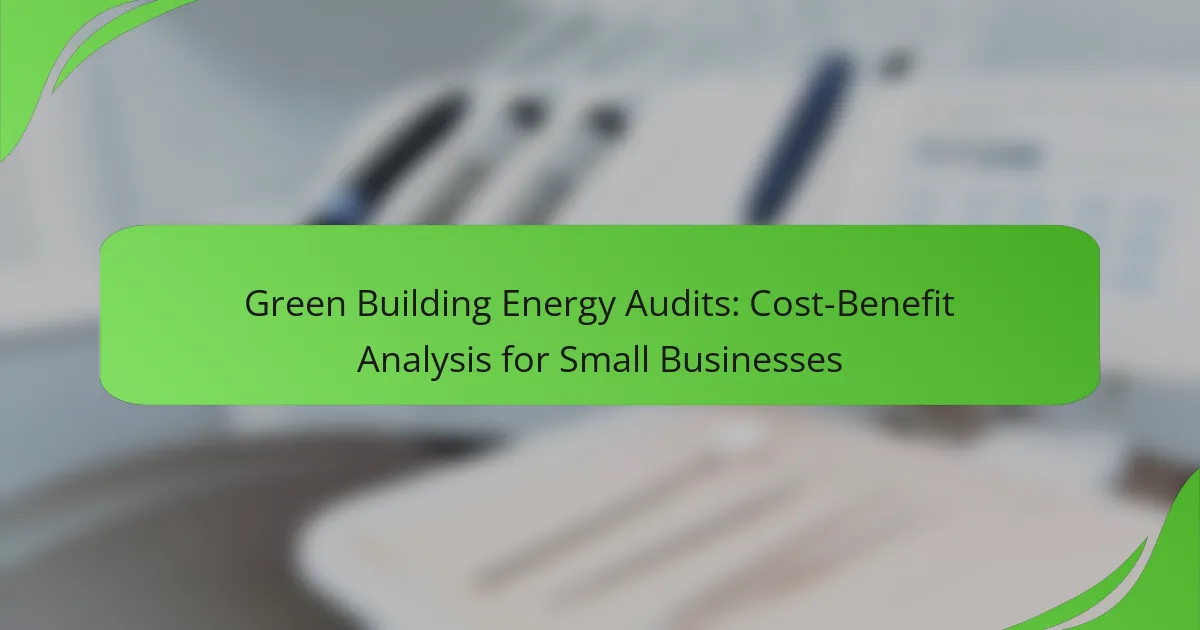Green building energy audits offer small businesses valuable insights into their energy usage, enabling them to identify inefficiencies and implement cost-saving measures. While the initial investment for these audits can vary, the potential for significant savings on energy bills and enhanced operational performance makes them a smart choice for many enterprises. Ultimately, the return on investment can be substantial, often surpassing the costs of the audit itself.

What are the benefits of energy audits for small businesses?
Energy audits provide small businesses with insights into their energy consumption, leading to various advantages such as cost savings, improved building performance, and a stronger sustainability reputation. By identifying inefficiencies, businesses can implement changes that not only reduce expenses but also enhance their overall operational effectiveness.
Cost savings through energy efficiency
One of the primary benefits of energy audits is the potential for significant cost savings. By pinpointing areas where energy is wasted, businesses can make targeted improvements that often lead to reductions in utility bills by 10-30%. Common upgrades include installing energy-efficient lighting, optimizing HVAC systems, and improving insulation.
To maximize savings, small businesses should consider implementing recommendations from the audit in phases, prioritizing changes that offer the highest return on investment. Additionally, many local governments and utilities provide incentives or rebates for energy-efficient upgrades, further enhancing financial benefits.
Improved building performance
Energy audits can lead to enhanced building performance by identifying inefficiencies that affect comfort and productivity. For example, an audit may reveal that heating or cooling systems are not functioning optimally, leading to uneven temperatures and discomfort for employees and customers alike.
By addressing these issues, businesses can create a more pleasant environment, which can boost employee morale and productivity. Regular audits also help ensure that systems are maintained properly, extending their lifespan and reducing the likelihood of costly repairs.
Enhanced sustainability reputation
Conducting energy audits and implementing their recommendations can significantly enhance a small business’s sustainability reputation. As consumers increasingly prefer to support environmentally responsible companies, demonstrating a commitment to energy efficiency can attract new customers and retain existing ones.
Furthermore, businesses can leverage their energy-saving initiatives in marketing efforts, showcasing their dedication to sustainability. This can include certifications, participation in local green programs, or simply sharing success stories on social media, all of which contribute to a positive public image and community goodwill.
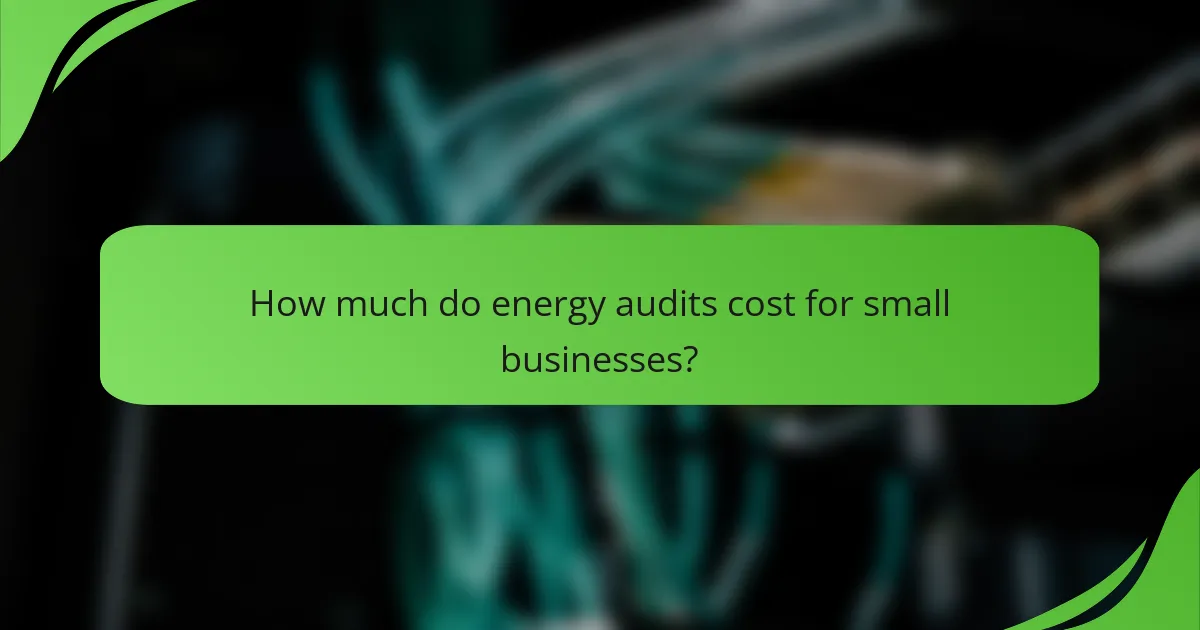
How much do energy audits cost for small businesses?
Energy audits for small businesses typically range from a few hundred to several thousand dollars, depending on various factors. The investment can lead to significant savings on energy bills and improved efficiency, making it a worthwhile consideration for many enterprises.
Average costs for commercial energy audits
The average cost of a commercial energy audit generally falls between $500 and $3,000. Basic audits, which may include a walkthrough and preliminary analysis, are usually on the lower end of this spectrum. In contrast, comprehensive audits that involve detailed assessments and recommendations can reach the higher end.
For small businesses, the specific cost will depend on the size of the facility and the complexity of the systems being evaluated. Some local utilities may offer rebates or incentives that can help offset these costs.
Factors influencing audit pricing
Additionally, the experience and qualifications of the auditor can affect pricing. Certified professionals or firms with a strong reputation may charge more, but they often provide more thorough and actionable insights. It’s advisable to compare quotes and services from multiple auditors to find the best fit for your business needs.
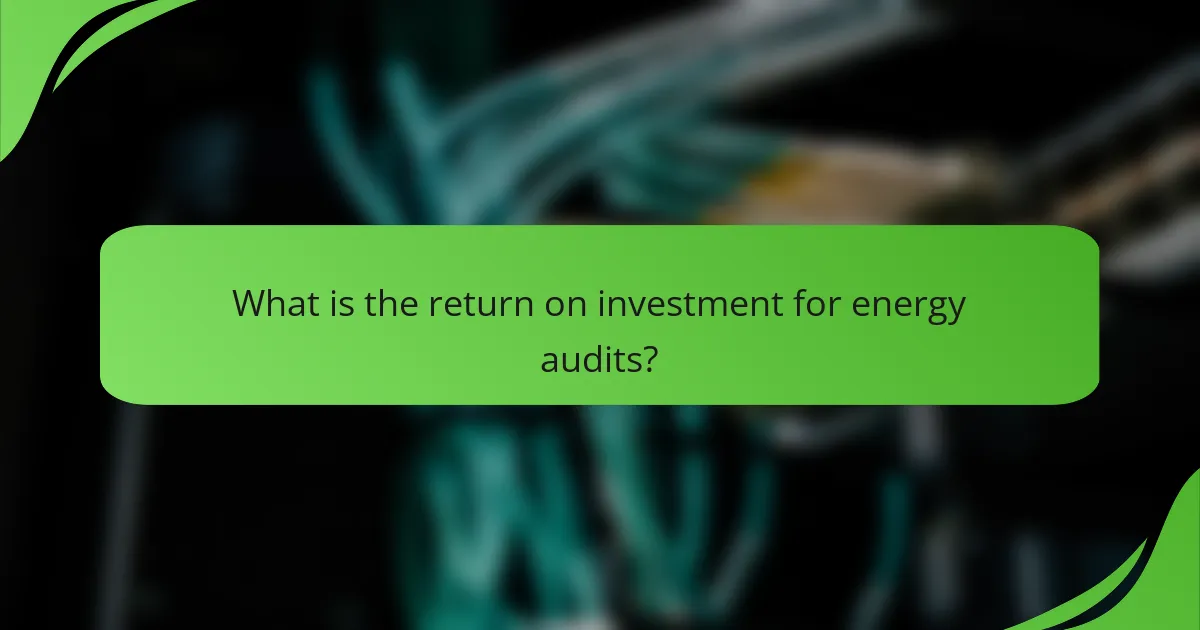
What is the return on investment for energy audits?
The return on investment (ROI) for energy audits can be significant, often yielding savings that exceed the initial costs of the audit itself. Small businesses typically see a positive ROI through reduced energy bills and improved operational efficiency.
Typical ROI percentages
Small businesses can expect an ROI from energy audits ranging from 10% to 30%, depending on the specific upgrades implemented. Factors influencing these percentages include the type of energy-saving measures adopted and the existing energy efficiency of the building.
For instance, implementing LED lighting or optimizing HVAC systems often leads to higher returns compared to less impactful changes. Tracking these percentages can help businesses prioritize which upgrades to pursue first.
Payback period for energy efficiency upgrades
The payback period for energy efficiency upgrades following an energy audit typically ranges from 1 to 5 years. This timeframe varies based on the scale of the upgrades and the amount of energy savings achieved.
For example, simple upgrades like installing programmable thermostats may have a payback period of less than 2 years, while more extensive renovations, such as insulation improvements, could take longer. Businesses should evaluate the long-term savings against the upfront costs to determine the best course of action.
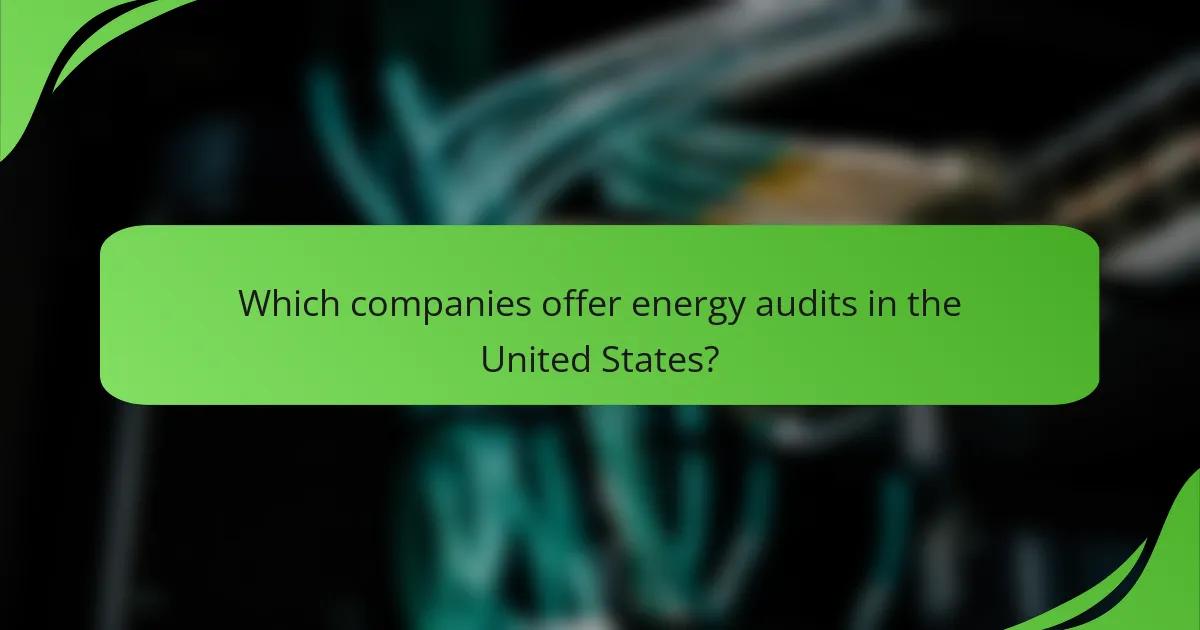
Which companies offer energy audits in the United States?
Several companies provide energy audits across the United States, helping small businesses identify energy-saving opportunities. These services can range from independent auditors to larger organizations with national reach, ensuring a variety of options for business owners.
Energy Star certified auditors
Energy Star certified auditors are trained professionals who follow guidelines set by the U.S. Environmental Protection Agency. They assess a building’s energy performance and recommend improvements that can lead to significant energy savings and reduced utility costs.
When selecting an Energy Star auditor, look for credentials and experience in your specific industry. Many auditors can provide a detailed report outlining potential savings, often resulting in a return on investment within a few years.
Local energy service providers
Local energy service providers often offer tailored energy audits that consider regional energy costs and incentives. These providers may include utility companies or independent contractors who understand local regulations and available rebates.
Engaging with local providers can yield more personalized service and quicker response times. Check for any partnerships with state or local governments that might offer additional financial incentives for conducting energy audits.
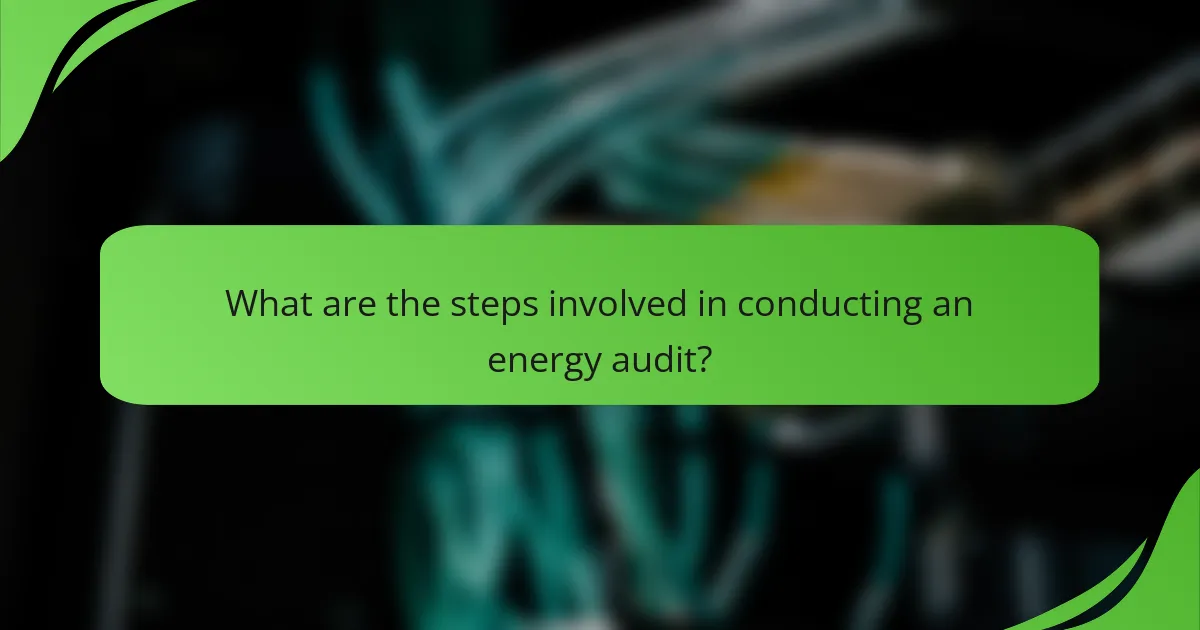
What are the steps involved in conducting an energy audit?
Conducting an energy audit involves a systematic evaluation of a building’s energy use to identify opportunities for efficiency improvements. The process typically includes an initial assessment, data collection, and analysis of energy consumption patterns.
Initial assessment and data collection
The initial assessment involves a walkthrough of the facility to identify energy systems and equipment, such as HVAC, lighting, and insulation. Collecting data on energy usage, operational hours, and equipment specifications is crucial for understanding the current energy landscape.
During this phase, businesses should gather utility bills for at least the past year to establish a baseline for energy consumption. This data will help in identifying trends and pinpointing areas that may require further investigation.
Analysis of energy consumption patterns
Analyzing energy consumption patterns involves reviewing the collected data to identify peak usage times and inefficiencies. This analysis can reveal which systems are consuming the most energy and where potential savings can be achieved.
Businesses can use software tools or spreadsheets to visualize energy usage over time, making it easier to spot anomalies. Common pitfalls include overlooking seasonal variations in energy use, which can skew the analysis if not accounted for.
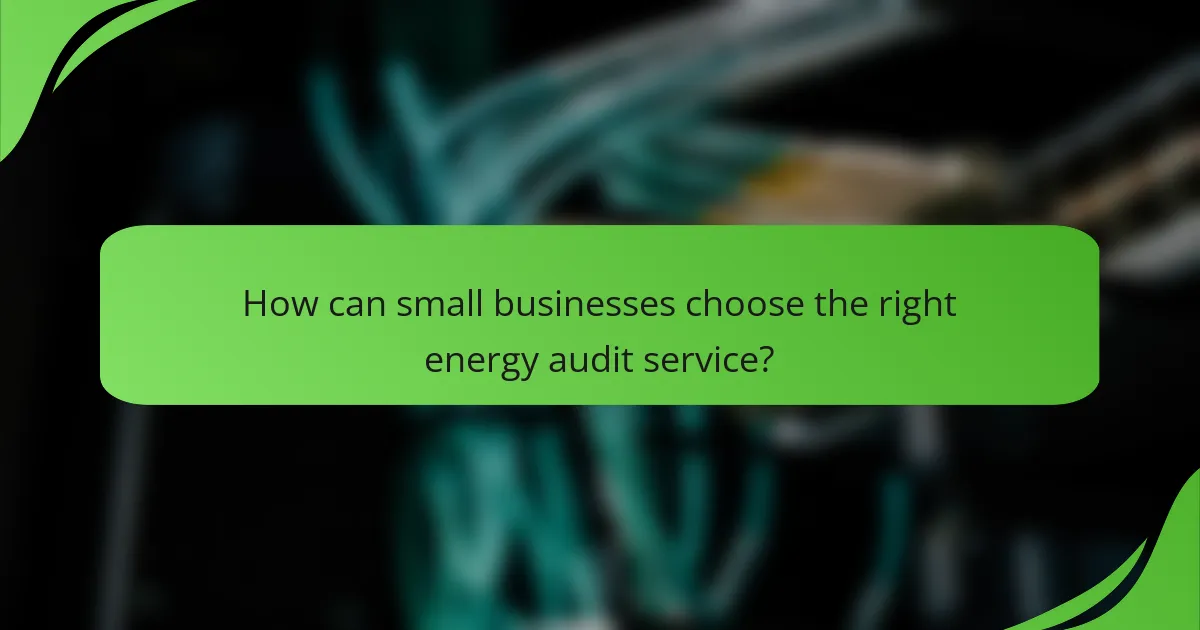
How can small businesses choose the right energy audit service?
Small businesses can choose the right energy audit service by assessing the auditor’s qualifications and comparing the specific services offered. Understanding these factors helps ensure that the audit meets the business’s unique energy needs and compliance requirements.
Evaluating auditor qualifications
When evaluating auditor qualifications, consider their certifications, experience, and reputation in the industry. Look for auditors who are certified by recognized organizations, such as the Association of Energy Engineers (AEE) or the Building Performance Institute (BPI).
Additionally, check for client testimonials and case studies that demonstrate their success in similar businesses. An auditor with a proven track record in your sector can provide tailored insights that maximize energy savings.
Comparing service offerings
Comparing service offerings involves looking at the scope of the audit, the tools used, and the depth of analysis provided. Some auditors may offer basic assessments, while others provide comprehensive evaluations that include detailed reports and actionable recommendations.
Consider requesting quotes from multiple auditors to compare pricing and services. A typical energy audit can range from a few hundred to several thousand dollars, depending on the complexity and size of the business. Ensure that the services align with your energy goals and budget constraints.
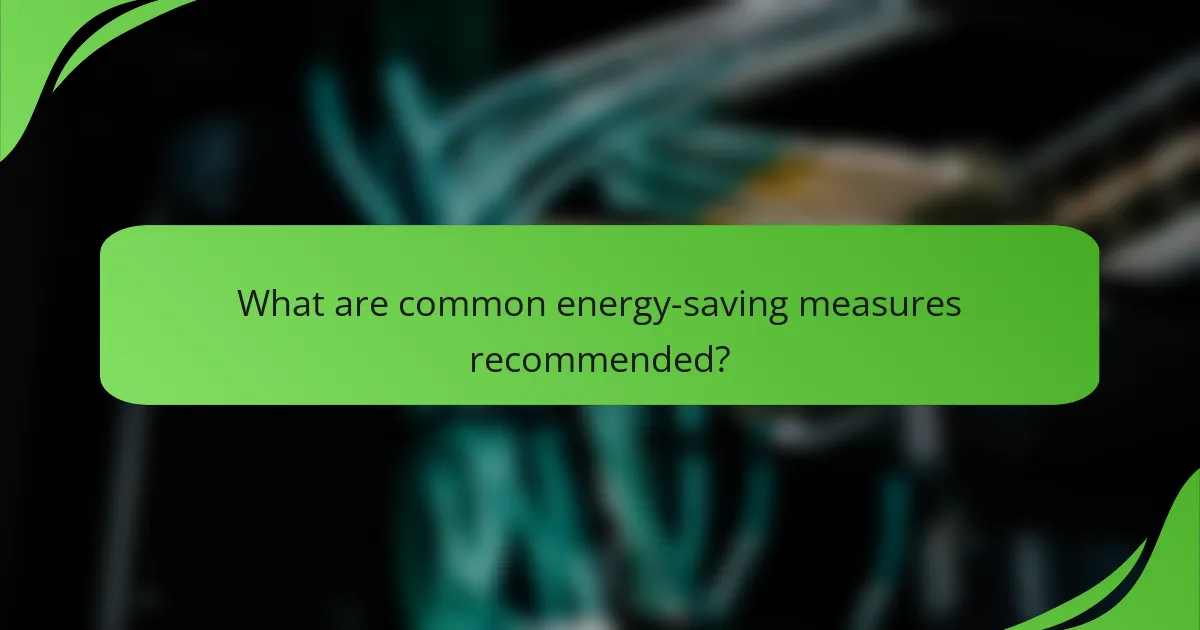
What are common energy-saving measures recommended?
Common energy-saving measures for small businesses include upgrading insulation, installing energy-efficient lighting, and optimizing HVAC systems. These strategies can significantly reduce energy consumption and lower utility bills, making them essential for cost-effective operations.
Upgrading Insulation
Improving insulation in walls, roofs, and floors helps maintain a consistent indoor temperature, reducing the need for heating and cooling. Small businesses should consider materials like spray foam or fiberglass, which can enhance energy efficiency. Proper insulation can lead to savings of 20-30% on energy bills.
Installing Energy-Efficient Lighting
Switching to LED lighting is one of the simplest and most effective energy-saving measures. LEDs use up to 75% less energy than traditional incandescent bulbs and last significantly longer. Small businesses can benefit from lower electricity costs and reduced maintenance expenses.
Optimizing HVAC Systems
Regular maintenance and upgrades to heating, ventilation, and air conditioning (HVAC) systems can lead to substantial energy savings. Implementing programmable thermostats and ensuring proper duct sealing can improve efficiency by 10-20%. Small businesses should also consider energy-efficient models when replacing old systems.
Implementing Smart Technology
Smart technology, such as energy management systems, can help businesses monitor and control energy usage in real time. These systems allow for adjustments based on occupancy and usage patterns, potentially reducing energy costs by 15-25%. Investing in smart technology can provide long-term savings and enhance operational efficiency.
